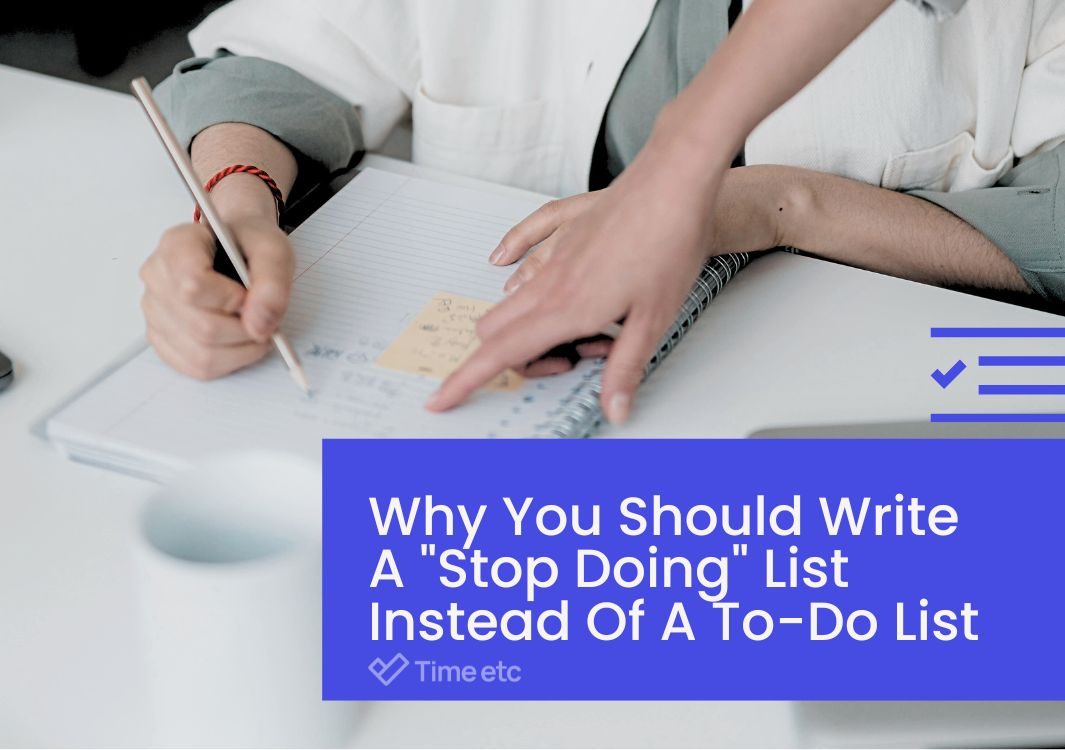Let me ask you something.
How would you use half a day if it magically appeared in your week?
What would change if you had space to think, plan, or simply breathe?
For most founders, this sounds like an impossible dream. Their schedules are jam-packed, their responsibilities are never-ending, and their days feel like a constant sprint between meetings, emails, and new requests.
But what if the problem isn’t that there’s too much to do?
What if the real issue is that you’re doing too much of the wrong things?
The problem with your current to-do list
To-do lists have been the go-to productivity tool for centuries, and for good reason. According to The Book of Lists author David Wallechinsky, “People are attracted to lists because we live in an era of overstimulation, especially in terms of information… and lists help us in organizing what is otherwise overwhelming.”
But for founders, the reality of running a business turns that neatly organized list into something far more chaotic.

It grows endlessly, leading to overwhelm and decision fatigue
A founder’s to-do list isn’t a simple checklist—it’s a never-ending, ever-expanding monster. Every day brings new challenges, ideas, and urgent tasks, making it nearly impossible to "finish" your list. Instead of crossing things off and feeling accomplished, you’re constantly adding more, leading to an overwhelming sense of falling behind.
Psychologists call this the Zeigarnik Effect, where unfinished tasks weigh heavily on your mind, causing mental clutter and stress. The more tasks you add to the pile, the harder it becomes to focus and the less effective you become.
Not only that, but this immense volume of tasks also leads to decision fatigue—the mental exhaustion that comes from making too many choices in a day.
Social psychologist Dr. Roy Baumeister’s 1998 research on self-control revealed that humans only have a limited supply of mental energy. Every decision we make, regardless of its importance, chips away at our ability to think clearly, solve problems, and make smart choices.
And when you're juggling multiple roles in your business and your to-do list is a mile long, that’s a lot of decisions you have to make each day.
Like many people, you might start your day with easier tasks to make a dent in your list early on. It might feel productive as you're checking things off, but these "quick wins" could be using up the mental energy needed for the tasks that truly move your business forward.
Then, those bigger priorities get pushed to the next day... and the next. Before you know it, you’re stuck in a frustrating cycle of always feeling busy but never quite getting ahead.
It gives the illusion of productivity
There’s no denying it—checking off tasks feels great. In fact, studies show that completing even the smallest task releases dopamine, the brain’s feel-good chemical. That little rush of accomplishment is why so many of us love to-do lists.
But the trouble with having so much on your plate is that being busy feels an awful lot like being productive—but they're not always the same.
For founders, this is where the danger lies. It’s easy to spend an entire day in a flurry of answering emails, troubleshooting minor issues, updating spreadsheets, tweaking websites, and so on. But the real question is: how many of those checked-off tasks actually drive meaningful results?
It’s like running on a treadmill—you’re exerting energy, but you’re not actually getting anywhere.
It's slowing you down
For decades, the business world has clung to a dangerous myth: the harder you work, the more successful you’ll be.
Many founders have fallen into the trap of believing that if they just squeeze in a few more hours at the office each day or cram more work into every spare moment they get, it'll take them even closer to the success they've envisioned. But in reality, piling more onto your plate doesn’t fast-track progress—if anything, it often does the opposite.
Think of it like trying to carry too many grocery bags at once when you're unloading your car. Sure, you might make it to the house in one trip, but not without a few crushed eggs, a jar of pasta sauce rolling down the driveway, and a mess to clean up. The same applies to work: when you take on too much, quality suffers, mistakes happen, and you’re left drained from the effort.
And let’s not ignore the cost to your well-being. Being constantly overloaded and overwhelmed leads to chronic stress, which can trigger burnout, weaken your immune system, and even cause long-term health issues. Running a business is hard enough when you’re at your best—let alone when you're sick.

The power of "stop-doing" lists
Don't worry, we're not about to tell you to stop making lists altogether. Instead, we want to focus on a different kind of list, one you may not have ever considered as a dedicated and driven founder.
A "stop-doing" list.
Legendary investor Warren Buffett once said, “Really successful people say no to almost everything.” He didn't get to where he is today by piling his plate sky-high—he did it through ruthless prioritization.
Consciously deciding what doesn’t deserve your time and energy can transform the way you work:
- Free up mental space: Every task you keep on your plate takes up mental bandwidth, whether you realize it or not. When your brain isn’t bogged down by trivial tasks, you can make better decisions, think strategically, and focus on high-impact work that only you can do.
- Better results in the hands of someone more skilled: The truth is, no one is great at everything. But as the leader of your business, you don’t need to be! When you hand off these tasks to someone who specializes in them, you’re not just freeing up your time—you’re making sure those tasks are done more efficiently and at a higher level of quality than if you did them yourself.
- Avoid burnout: Shifting your focus from quantity to quality in your workload helps you break free from the relentless cycle of stress. No more scrambling to keep all the different plates spinning, burning the candle at both ends to get everything checked off your list, or sacrificing essential downtime to stop yourself from falling even further behind.
How to create your own "stop-doing" list
In his book The Stop Doing List: More Time, More Profit, More Freedom, business coach and entrepreneur Matt Malouf shares a simple yet powerful strategy:
Step 1
Start by writing down every single task you handle in your business. Yes, everything—from scheduling meetings to creating presentations to updating social media.
Step 2
Once you've got your list, sort each task into one of four categories:
Genius tasks: These are the tasks that light you up! According to Malouf, a true "Genius" task must check these three boxes:
- You’re passionate about it—You could do this all day and still have energy left over. It excites and motivates you.
- It’s essential to your business—If nothing else got done today, this still has to happen.
- It directly contributes to profit—The more you focus on these tasks, the more your business thrives.
These are the things you should hold onto and do more of, if you can.
Excellence tasks: These are things you’re really good at and valuable to your business, but they don’t necessarily excite you.
Competence tasks: Whether it's general admin work, social media, data entry, or writing content, Malouf says, “These are tasks you can do, but you really shouldn’t.” Why? Because someone else—who works in their genius—could do them better.
Incompetence tasks: These are tasks that need to be done, but you have no idea how to do them, or it's taking you a long time to learn.
Step 3
If you want to be as productive and profitable as possible (without running yourself into the ground), around 60-70% of your workload should be "Genius" tasks—the work that excites you, drives results, and makes the biggest impact. The remainder should be made up of "Excellence" tasks.
Everything else? That’s your stop-doing list.
All tasks in your "Competence" and "Incompetence" categories should be taken off your plate immediately, and either automated, outsourced, or eliminated completely.

What's the bottom line?
As a founder, your focus is your most valuable asset. Admin and busywork are stealing it right out from under you.
The truth is, you don’t have to do it all. In fact, you really shouldn’t.
The most successful founders aren’t the ones who cram every minute with tasks; they’re the ones who create space for what truly matters—and protect it at all costs.
A “stop-doing” list is your first step, cutting out the non-essential and creating space for what you truly need.
So, instead of chasing more, aim for better. Less noise, more impact. Fewer tasks, better results.
Ready to create the space you need?
What you need now is someone who can roll up their sleeves and take those 'Competence' and 'Incompetence' tasks off your plate for good.
That's where we come in.
At Time etc, we connect you with qualified, capable virtual assistants who are ready to step in and take care of all the routine, day-to-day tasks that have been weighing you down.
We know that finding, hiring, and onboarding the right assistant is a ton of extra work you really don't need. That's why we do it all for you.
By partnering with us, you can:
- Save 3-6 weeks of recruitment time
- Cut traditional hiring costs by up to 90%
- Get the expert help you need, exactly when you need it
- Skip the day-to-day hassle of managing your assistant once they join your team.
Getting started is simple:
- Speak with our expert team—all you have to do is tell us what you need, and we’ll take care of the rest!
- Or, answer a few quick questions to receive personalized recommendations tailored to your unique needs, and enjoy $150 off your first month of virtual assistant support.










